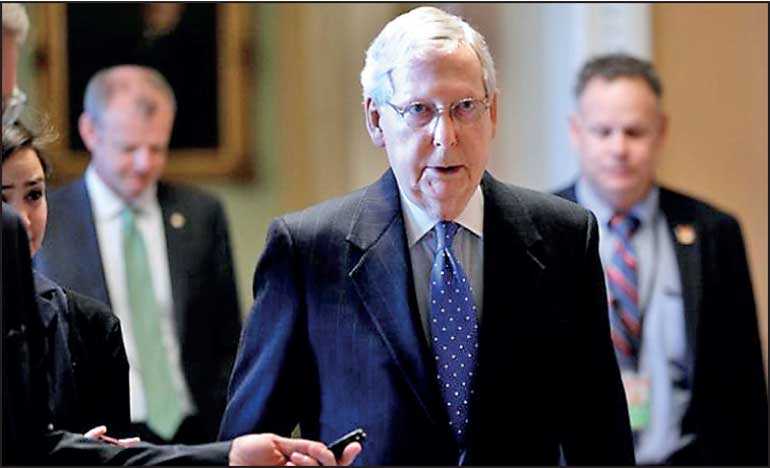Friday Feb 20, 2026
Friday Feb 20, 2026
Friday, 20 March 2020 00:00 - - {{hitsCtrl.values.hits}}

Washington (Reuters): The Republican-led US Senate was scrambling on Thursday to hammer out details of a $ 1 trillion-plus package to stem the economic fallout of the coronavirus pandemic, a crisis that has sparked a rare moment of bipartisanship.
Senate Majority Leader Mitch McConnell said the bill eagerly sought by the Trump administration would include direct financial assistance to Americans, lending to key industries including airlines and money for more medical equipment.
“These are not ordinary policies. This is no ordinary time,” McConnell said on the Senate floor. “We have to beat back this virus.”
The package is the third taken up by Congress since the coronavirus erupted in the United States, killing more than 150 people, shutting schools, businesses and wide swaths of American life, and sending the stock market into a tailspin.
Senate Democratic Leader Chuck Schumer said whatever package is developed must include a “massive infusion of resources” for hospitals, and there must be worker protections in any industry bailouts. As for the prospect of direct cash payments to individual Americans, Schumer said they needed to be “bigger, more generous, and more frequent” than he had heard Republicans describe.
President Donald Trump sharply changed his tone on the risks posed by the virus this week, after long downplaying them, and has talked about sending Americans $ 1,000 checks.
McConnell repeated that the Senate would remain in session until it finishes the legislation and sends it to the Democratic-controlled House of Representatives.
“We’re not leaving until we do our job,” he said.
House leaders, meanwhile, were trying to work out new voting procedures that would allow them to reconvene without endangering members after Utah Democrat Ben McAdams and Florida Republican Mario Diaz-Balart tested positive for the virus.
House Majority Leader Steny Hoyer wrote to lawmakers telling them they would not be called back into session until they needed to vote on the legislation, and that the House would adjust its voting procedures so that fewer people would be on the chamber’s floor at any one time.
Congress passed an $ 8.3 billion measure earlier this month to combat the coronavirus outbreak and develop vaccines for the highly contagious disease that has infected about 9,000 people in the United States and killed more than 150. The outbreak has paralysed large sectors of the US economy and led to fears of a global recession.
On Wednesday, lawmakers approved and Trump signed another $105 billion-plus plan to limit the damage through free testing, paid sick leave and expanded safety-net spending.
For the third package lawmakers are working on now, the Trump administration has proposed a stimulus in the range of $ 1.3 trillion. This would include $500 billion in direct payments to Americans, possibly in the form of two rounds of checks that Trump said could amount to $ 1,000 each. The strategy, as outlined in a Treasury Department memo, also would provide $ 300 billion for small businesses, $50 billion in loans for cash-strapped airlines and $ 150 billion for loan guarantees to other distressed economic sectors.
Two Republican senators, Marco Rubio and Susan Collins, said the $ 300 billion for small businesses would be in loans that could be converted into grants.
The Trump administration also asked Congress for an additional $ 45.8 billion to shore up US government agencies responding to the outbreak.
US Treasury Secretary Steven Mnuchin, in an interview with Fox Business Network, urged Congress to act by early next week. Schumer said he had been in talks with Mnuchin and Federal Reserve Chair Jerome Powell, and that he would meet with McConnell later in the day.